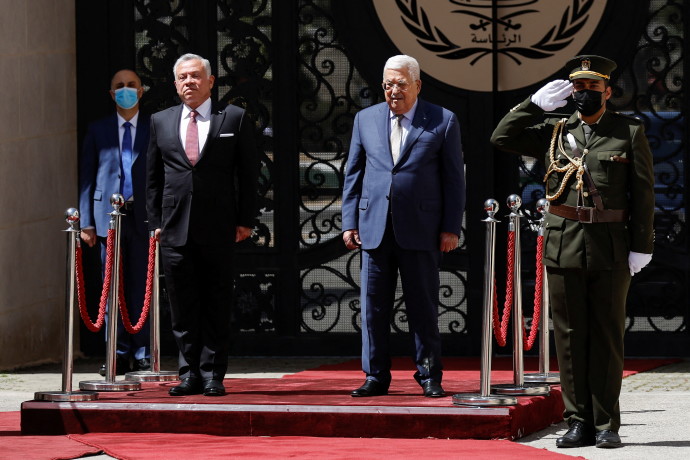Israel has pushed closer to Jordan in a massive effort to prevent an outbreak of Israeli-Palestinian violence next month that could destabilize both countries.
President Isaac Herzog is set to make the first-ever “public and official” visit to Jordan, either by himself or by any of his predecessors since the country’s founding in 1948, according to a presidency spokesperson.
Herzog and King Abdullah will discuss “deepening Israeli-Jordanian relations, maintaining regional stability with an emphasis on the upcoming holiday period, strengthening peace and normalization, and the many latent opportunities in relations between Israel, Jordan and the wider region,” the President’s Office said.
Past presidents and Herzog have gone to Jordan, but always in secret meetings publicized only after the fact. Herzog will meet with Abdullah in his palace, just one day after Defense Minister Benny Gantz visited and a week after Public Security Minister Omer Bar Lev was in Jordan to meet with the country’s Foreign Minister Ayman Safadi.
Abdullah on Monday made a rare visit to Ramallah, his first in five years, to discuss with Palestinian Authority President Mahmoud Abbas the threat from the religious fervor that could be caused by the overlap next month of the Passover, Easter and Ramadan. The conjunction of the three festivals last year helped spark tensions in Jerusalem, ethnic Israeli-Arab violence and an 11-day war with Gaza.
Jordan has a special custodial role with respect to Jerusalem’s Temple Mount, also known as al-Haram al-Sharif, which is the holiest site in Judaism and the third holiest for Islam. It is one of the flash points for the Israeli-Palestinian conflict and has a ripple effect in neighboring Jordan.

With a majority of Jordan’s citizens of Palestinian descent, Palestinian self-determination and maintaining the status quo of al-Aqsa Mosque in Jerusalem – which is administered by the (Jerusalem) Wakf Islamic religious trust, instituted by Jordan after Israel’s War of Independence – are key aspects of public discourse in Amman.
Both countries understand that should security ties fail, not only will the king face instability at home, but the Jordanian street violence could spill over the border to Israel.
Bar Lev discussed changes to security arrangements on the Temple Mount during his meeting in Jordan, including increases to the number of Wakf security guards.
On Tuesday, in a meeting that addressed regional security challenges, Gantz and Abdullah discussed the steps that Israel intends to take ahead of the month of Ramadan.
They discussed the need to preserve freedom of worship in Jerusalem and the West Bank, the importance of security coordination during the holy days as well as additional steps that can be taken in order to improve the lives of Palestinians, according to a Defense Ministry statement.
They also discussed the two recent ISIS-linked terrorist attacks in Hadera and Beersheba that claimed the lives of six Israelis.
The Gantz-Abdullah meeting was coordinated with Prime Minister Naftali Bennett, who has been engaged in a public spat over the defense minister’s desire to meet with the king and Abbas at Monday’s Ramallah meeting.
According to Israeli media, Bennett stopped Gantz from participating in the meeting and expressed his “displeasure” from Gantz’s failure to tell him of his plans.
On Saturday, Culture and Sport Minister MK Chili Tropper (Blue and White) told Channel 13 that Gantz wanted to meet with Abbas in Ramallah in order to avoid an escalation in tensions.
The defense minister has met with the two men before. Gantz first met Abbas in August, marking the first meeting of a senior Israeli government official with a PA leader since 2010. He then hosted Abbas in his home in Rosh Ha’ayin in December in order to discuss issues related to security and the economy.
Gantz and Abdullah then met in January to discuss improving Israeli-Jordanian ties and issues of mutual concern, including ways to enhance security and stability in the region. The two men previously met ahead of the February 2020 election.
Amman and Jerusalem not only have robust security coordination and intelligence-sharing mechanisms regarding the common threats, but according to foreign reports, Jordan has allowed Israeli jets to use its airspace for its war-between-wars campaign in Syria.
In October, a German military photographer posted two pictures of Jordanian fighter jets taking part in Israel’s Blue Flag aerial exercise on social media, inadvertently revealing that the kingdom had participated in the drill.
Until the photos were posted, Jordan’s participation in the two-week long biannual exercise had officially been kept secret.
The strategic depth provided by Jordan, which has not entered into any alliance with neighboring countries hostile to Israel, has kept Israel’s eastern and longest border the quietest and safest for decades.
The meetings also come as Jordan is pushing for renewed Israeli-Palestinian talks, despite US reticence to put a peace plan on the table and Bennett’s refusal to negotiate with the Palestinians.
US Secretary of State Antony Blinken, who visited Jerusalem and Ramallah this week, pledged allegiance to the vision of two states but took no actions to advance talks, which have been frozen since 2014.
The Royal Hashemite Court said that the king in his talk with Gantz, “stressed the importance of stepping up efforts to relaunch serious and effective negotiations between the Palestinians and the Israelis to achieve peace, on the basis of the two-state solution, guaranteeing the establishment of an independent Palestinian state on the 4 June 1967 lines, with East Jerusalem as its capital, noting the need to stop all measures that undermine prospects of achieving peace.”
Israel, however, has advanced ties with its Arab neighbors, holding the first-ever quadratic Arab summit Monday in the Negev, with Blinken and foreign ministers from Egypt, the United Arab Emirates, Bahrain and Morocco.
